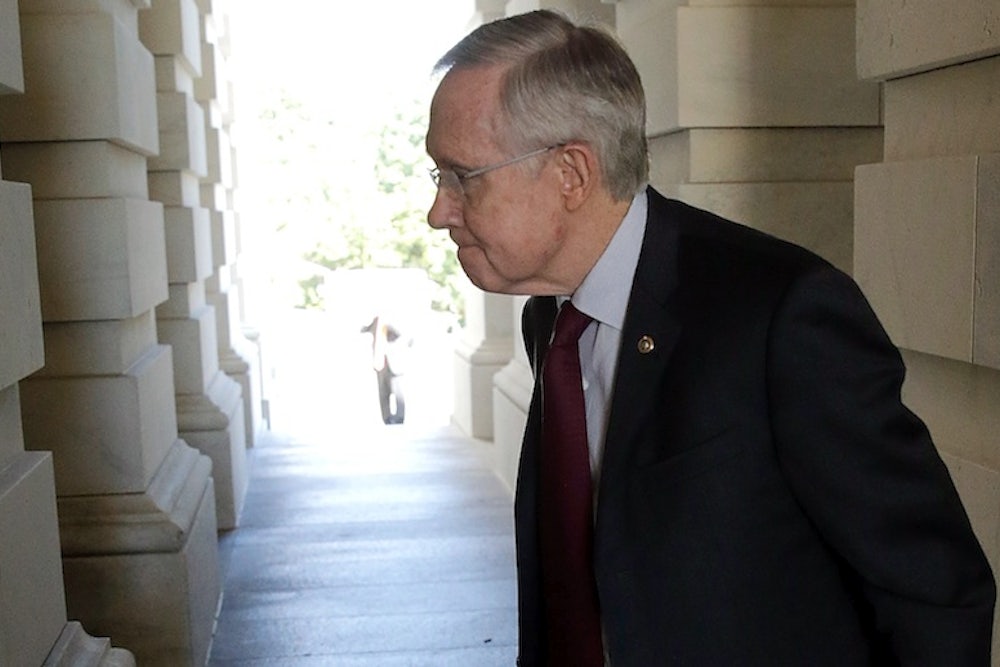There was a moment, approximately 327 days ago, when many Republicans agreed that they needed a rebrand to overcome a modest disadvantage in national elections. The last 327 days haven’t gone according to plan. A Pew Research survey showed the GOP’s favorability rating down to just 33 percent—the lowest in twenty years of polling. Immigration reform is in critical condition, if it’s even alive. And today, Republicans are at the precipice of shutting down the government and incurring another round of public outrage. So it might seem easy to imagine Democrats riding a wave of anti-Republican sentiment to a new House majority. But it's not likely.
The belief that a shutdown would be an electoral disaster for Republicans is steeped in Clinton-era political mythology. According to legend, the 1995-1996 shutdown put President Clinton on a pathway to reelection; the ’98 impeachment proceedings gave Democrats gains in the House. But the myth crumbles under scrutiny. Yes, polls said that the public blamed Republicans for the 1995-1996 shutdown. Yet there’s not much evidence that voters punished Republicans at the ballot box. Democrats only gained a net-2 seats in the House, despite many opportunities among freshman Republicans elected in the GOP wave of 1994. Democrats lost two Senate seats.
The myth, then, hinges on the unsubstantiated assumption that Republicans were poised to follow-up on their 1994 victory with another round of big gains. I just don’t think that’s a serious argument. Strong economic growth already made Clinton a clear favorite to win reelection, as The Guardian’s Harry Enten noted last week. And in 2000, just two years after a yearlong impeachment ordeal, George W. Bush outperformed the economic fundamentals, which were generally consistent with a modest Democratic win.
We cannot test how the ’96, ’98, or ‘00 elections would have proceeded without Republican antics. But nothing about the results suggests something unusual was afoot. Certainly, there is no evidence of an outright rebellion, the type of “wave” election necessary to expel today’s Republicans from their safely conservative redoubts.
To be sure, the backlash against the tea party could be more ferocious than the public’s apparently muted response in 1996. Congress and the Republican Party are less popular today than they were 17 years ago. Many Republicans, including most Senate Republicans, seem baffled by their tea party colleagues. That may shift the balance of media coverage even further toward Democrats. And should the worst case scenario come to pass, going over the debt limit could do far more damage to Republican fortunes than any government shutdown.
But if there is a particularly massive public revolt, Democrats aren’t well positioned to capitalize. The president’s approval rating is mired in the low-forties; if that holds next November, it will be difficult for Democrats to make meaningful gains, no matter how much the public despises Republicans. Clinton’s ratings were well above 50 percent when Democrats made slight gains in 1996 and 1998. There's even a case that a shutdown would hurt President Obama's approval ratings, which might have happened to President Clinton, too. And House Republicans are ensconced in safely conservative districts—made safer by low non-white and youth turnout in an off year election—to an extent that Republicans in 1996 couldn’t have even dreamed. As Dave Wasserman observed, today's average Republican House seat is 11 points more GOP than the country. That's near twice as Republican as the average House seat in 1995, which was 6.6 points more Republican than average.
There’s also cause to question whether the public will side as overwhelmingly with President Obama as it did with President Clinton. Surveys do show that the public would blame Republicans more than President Obama, but the margin may be slighter than Clinton’s edge in 1995. For instance, a Pew Research survey said that 43 percent of adults would blame congressional Republicans, compared to 40 percent who would blame President Obama. Other surveys show Obama with a wider advantage, but there wasn’t a survey that showed such a narrow margin in 1995.
All considered, Democratic dreams of winning back the House still seem far-fetched. And while that might be frustrating if you believe Republican mischief should disqualify the GOP from a hand in governance, the GOP grip on the House shouldn’t be very surprising. We’ve been through this before. Supposed game changers—the debt ceiling debacle, guns, immigration, and the sequester—all failed to inaugurate sustained and widespread revulsion against the Republicans. Or, at the very least, such revulsion hasn't overcome the president's middling approval ratings.
That doesn’t mean there aren’t costs to Republican shenanigans. A tea party-led shutdown would reinforce just about every reason why the public doesn’t like the Republican Party—that they’re extreme, unconcerned with real problems, and unwilling to compromise. That may not concern representatives running for reelection in safe districts, but it could matter in the Senate, where the GOP needs to beat Democratic incumbents, not just defend safe seats. The GOP’s image problem will make life more difficult for its eventual 2016 nominee. And with 28 percent of the time between Obama’s reelection and the 2016 Iowa caucuses now in the rearview mirror, the GOP can’t afford to reinforce and deepen its existing problems.
